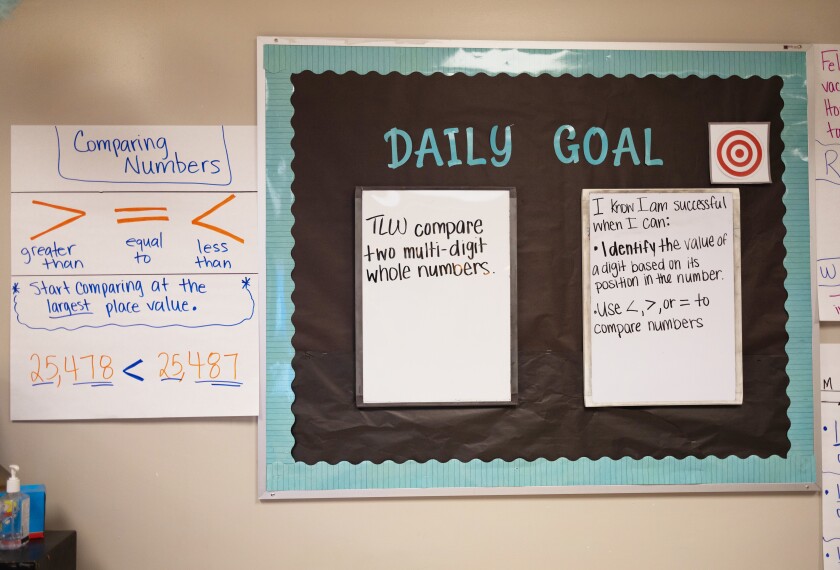Teaching math isn’t just about working through problems. Often, it’s about helping students work through baggage, too.
After years of historic declines in math performance nationwide and sharp post-pandemic spikes in general and math-specific anxiety, teachers may need to help students unpack negative emotions around math to help them gain traction in the subject.
“People are not OK with math; there’s so much trauma surrounding it,” Vanessa Vakharia, a K-12 math teacher and instructional coach in Ontario, Canada, said at the annual National Council of Teachers of Mathematics conference here this week.
Vakharia, who had crippling math anxiety until late high school, now chronicles her own and others’ traumatic experiences with math in the Math Therapy podcast. One in 4 K-12 educators reported being math-anxious in a 2019 survey by the EdWeek Research Center, and in a separate survey the center conducted last month, more than 40 percent of math teachers said they’d had at least some math anxiety.
“We’re talking about unpacking trauma, but none of us are therapists,” she said. “This is about how we can do this as educators with our expertise in a way that’s safe in our classroom and that we feel comfortable with.”
She highlighted five steps teachers can take to help students understand and let go of negative math experiences.
1. Create a myth-busting mindset.
Often small classroom practices—highlighting students’ wrong answers in front of the class, for example—can undermine students’ math identity, particularly for students from groups historically underrepresented in math, Vakharia said.
“It is a deeply embedded trauma being told what we need to look like, sound like, be like, perform like in order to be good at math, being told you have to shed your identity in order to be good at math,” Vakharia said.
She suggested teachers explicitly bust common misconceptions—such as that math ability is static or that creative or artistic students don’t need math—and quickly counter students’ negative talk about math.
“Let’s say something that’s more accurate,” Vakharia tells her students. “So instead of saying ‘I’m not a math person,’ how about, ‘I don’t feel as comfortable with math as I would like to, but I believe I could if I wanted to.’ That’s actually fair.”
2. Help students map out math trauma.
Vakharia encourages her students to identify and talk about experiences that made them feel bad about math.
These could include someone dismissing a student’s math struggles by saying they “can be good at other things,” media portrayals suggesting that “everybody hates math,” or parents who pressure or yell at their children during math homework (as student tweets like the one below can attest).
“Your goal is to figure out what trauma exists in your classroom so that you can adjust your teaching style and your pedagogy, so you know what students will react to,” she said.
For example, Vakharia’s students discuss situations that trigger their anxiety—such as having another student yell “I’m done” while they are still working—and make student and teacher pacts to reduce class stressors.
3. Motivate students to persist.
Research suggests the vast majority of math-anxious students aren’t initially low-performers. Rather, the fear and stress they experience before starting math tasks takes up their mental bandwidth and leads them to avoid math-related tasks. Over time, students with severe math anxiety tend to progress more slowly in math, but even math-anxious students who objectively perform on average or even high in math often end up disengaging and avoiding math classes and fields they might otherwise thrive in.
Students with math anxiety tend to choose less-effective ways to study, too, like rereading already-solved problems instead of trying to solve new ones. That makes students less prepared come test time, which can create a cycle of stress, failure, and avoidance.
Some classes keep a “failure wall,” in which students regularly post cards describing mistakes or failures and what they learned from them. The process helps students both reflect on their own learning and realize they are not alone in struggling, Vakharia said.
4. Have ‘math identity makeovers.’
“If you ask any kid what being good at math is, they’ll say it means you’re really fast. It means you don’t make any mistakes. It means you always get the right answer. That kind of thing,” Vakharia said. “We have to myth-bust that for them.”
Vakharia advised teachers to use math journals and data reviews to help students analyze their own progress and think about what success means to them.
“When you have a track record of all the things in your class, you can prove that they can get better at a skill. And then you can go farther: Why did you [previously] think that you couldn’t do this? And why do you think you can do it now?’ And they’ll say things like, ‘I practiced,’ or ‘I got some help, I sought these resources.’ ... This is really helpful in bringing a growth mindset to life and myth-bust what it means to be good at math.”
Teachers should also help students to understand that having a disability that interferes with math, like dyscalculia or attention deficit disorders, doesn’t mean they can’t do math or succeed in a math field.
5. Measure and highlight progress.
Assessments can be particularly daunting for students with math anxiety. When possible, Vakharia advised teachers to avoid timed tests, and to allow students to talk through feelings of anxiety before assessments.
Second chances are also helpful. For example, when students ask to redo a test or assignment, she asks them to first list how they prepared the first time, and what they plan to do differently this time.





